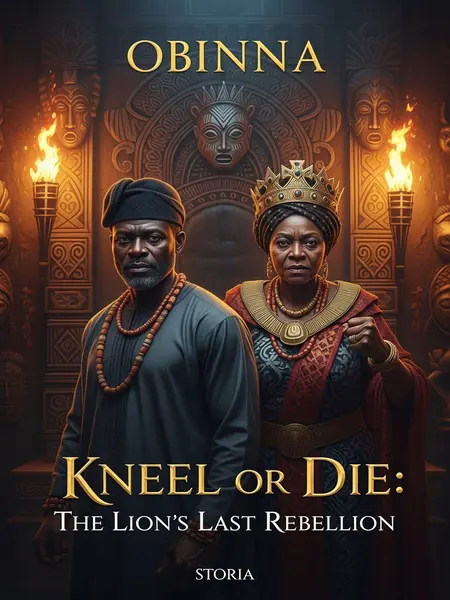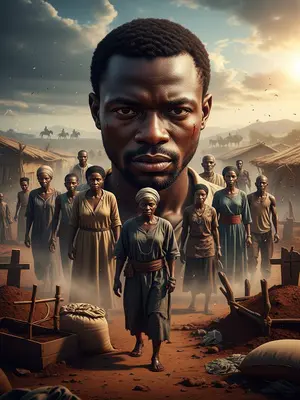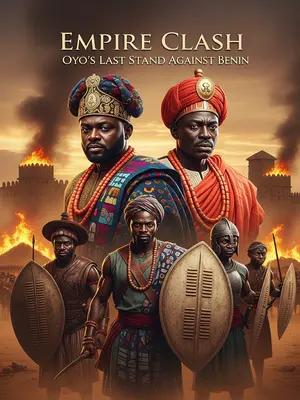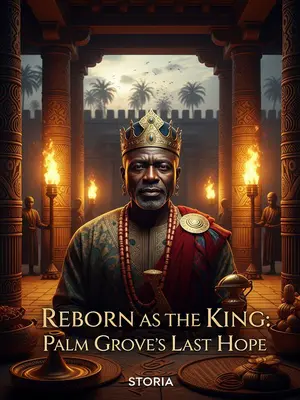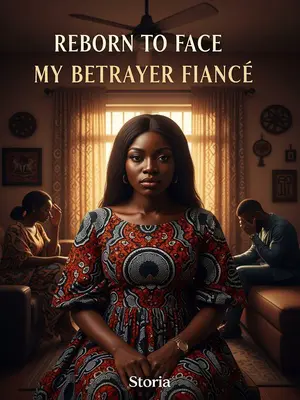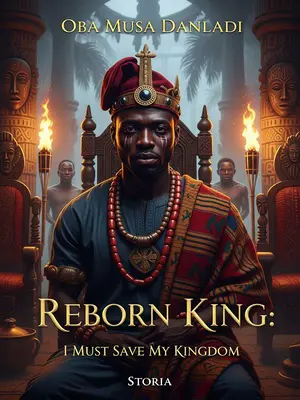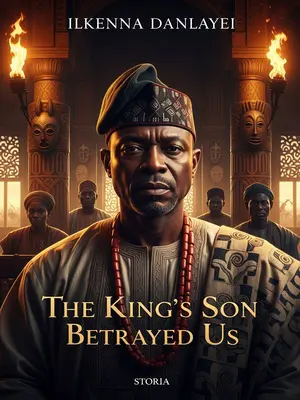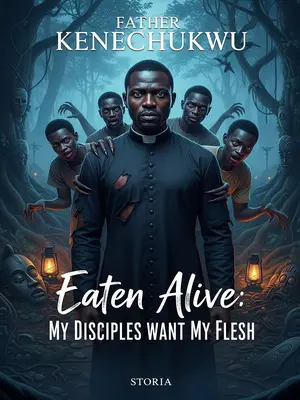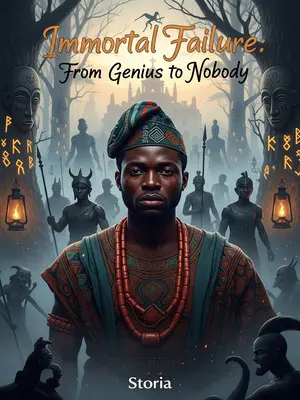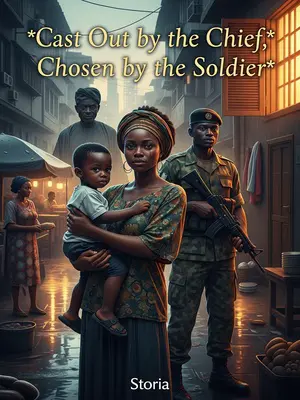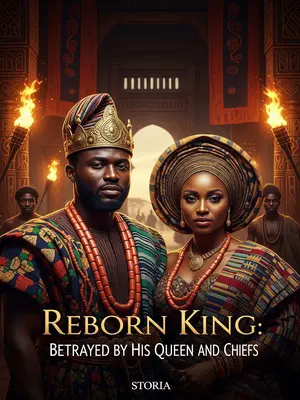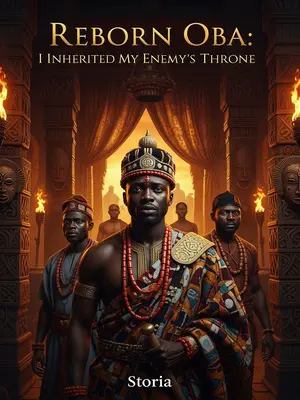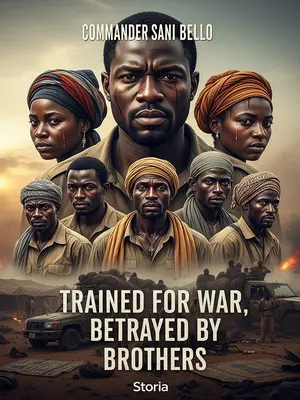Chapter 2: The Kneeling King
Before day break, Ibrahim Nri open him eyes again, full of wahala for mind.
He woke before the cocks crowed, the palace compound still blanketed in grey mist. His heart pounded as restless spirits danced behind his eyes. He lay there, listening to the far-off drums, the waking of goats, and the mutter of wind through ajar windows. Every morning like this, trouble wore a fresh wrapper, and the air smelled of something waiting to break.
That golden age of Great Nri don waka pass tey tey. Now na the second day for the tenth month, twentieth year of Adesuwa’s reign. This kind situation no new to Ibrahim Nri; after all, this soul-travel matter, e be like say na him get am for hand.
He stretched out, staring at the cracked ceiling boards, memories thick as ogbono soup swirling in his mind. The dust of old glories clung to his thoughts, but he shoved them aside like a stubborn market woman refusing bad change. This was not the life he bargained for, but inside his bones, the history of many lives lay coiled, waiting to strike.
But wetin dey make am tire no be ordinary yellow millet dream, nor change of dynasty—
The ache in his chest had nothing to do with broken thrones or visions of millet ripening under distant sun. It was the sharp pinch of reality, the memory of loss and the sting of pride, like the bite of fresh pepper on a healing wound.
Na Adesuwa sixtieth birthday.
That old witch dey return from Palm Grove Estate go Royal Compound today, go dey look scenery, dey chop mango, while Ibrahim suppose show say e get respect.
He pictured her—Adesuwa, her wrapper always shining, her eyes never missing any detail, her lips stained with mango juice and sharp words. She was the type to spot a loose thread in a crowd, then unravel it till your secrets fell out. Today, protocol must be perfect; any mistake, and the gossip would fly faster than Okada for rush hour.
How e go take show am?
His mind rolled over the question like a dundu seller weighing battered yams. Every step had to be precise. Even his heartbeats seemed to wait for instruction.
Early morning, he go first waka go Palm Grove Estate, kneel down greet Adesuwa, wish am safe journey.
He rehearsed the greetings in his head, voice softening, smile forced. The memory of last year’s fiasco—the side-eye from the old women, the silent snort from Adesuwa herself—reminded him to get every word right. He even pressed his best wrapper the night before, refusing to let the palace maids touch it, as if only his hands could bless his luck.
After that, he go waka for front, dey lead the way reach Big Market Road, where Adesuwa go stop to enjoy the view, and Ibrahim go kneel down dey wait. Once Adesuwa golden palanquin don waka pass reach far, Ibrahim go run go front, find shortcut, enter palace through Lion Gate.
His knees already ached just thinking about it. He imagined the jeering glances of palace children, the sly laughter of the guards hidden behind stiff faces. Still, tradition demanded the full procession—no shortcut for respect. Every time the palanquin paused, his heart would pound like bata drums in a crowded shrine.
Once he enter, he go kneel again—kneel dey wait till Adesuwa show.
Each kneeling left dust on his wrapper and salt in his pride, but he would kneel, again and again, for the eyes of everyone in the palace and the invisible gaze of ancestors lingering above the door.
And who be this unlucky Ibrahim?
Na none other than the great King Obinna of Umuola.
In the hush before dawn, he sometimes touched the scar on his shoulder—a memory of old battles, now hidden under royal robes. He, Obinna, the Lion of Umuola, reduced to this life of careful steps and forced bows.
Every morning as he open eye, Ibrahim Nri go just dey ask himself: How many times I go still kneel? How many years I go dey act like obedient pikin? The vex for him chest dey boil.
He would mutter prayers, half to God, half to his ancestors, wondering when humiliation would end. His fists tightened on the edge of the bed, the veins on his arms swelling with suppressed rage, even as he forced his face into the proper mask of obedience.
Since he transmigrate enter Ibrahim body, Obinna don dey live like this for five years.
He counted the seasons by the taste of new yam and the laughter of children growing taller with each festival. Five long years, each one marked by the grinding of his own teeth, the slow parade of loss and waiting.
Obinna: Five years—una know how I take manage survive these five years? Me wey be Lion of Umuola, Grand General of the People’s Warriors. When I don ever chop this kind shame?
He would tell himself these words at night, sometimes aloud, sometimes whispered into the darkness, so even the ancestors could bear witness to his bitterness. The memories of command—of roaring voices and stomping feet—haunted him, mocking every forced bow he made.
But anytime Obinna close eye, na to see the big fire for Royal Library, the cry of people everywhere, the plenty spirits of those wey die for good cause—all of them go just rush enter him heart.
The images came like harmattan dreams: tongues of flame licking ancient scrolls, the wails of women torn from their homes, ghostly hands reaching through the smoke, demanding justice. Their voices tangled with his own guilt, becoming a chorus that never slept.
These things don dey pursue am since the first day he land for here. At first, he think say with young body, nothing fit shake am.
He believed himself unbreakable, his new skin immune to the poison of regret. But every day chipped away at his confidence, like the slow work of termites inside a proud iroko tree.
No matter the dynasty wey fall or whose dream scatter, he fit handle am.
He promised himself he would remain strong, the backbone of his people, even if he walked alone. He wore his loneliness like a hidden talisman, a quiet oath beneath the noisy business of palace life.
The history for him head dey flash, some things dey make Obinna vex: the Abacha Rebellion, Fall of Makurdi, Ten Days of Jos, Three Massacres of Eziokwu after Garba people enter Middle Belt.
Each name was a wound that never healed. He recited them like bad proverbs: Abacha, Makurdi, Jos, Eziokwu—each a grave, each a lesson. The air around him grew heavy with the names of the dead, the weight of stories unfinished.
Obinna just take deep breath, think say na to overthrow this dynasty and bring back Igbo and Nri style.
He closed his eyes and inhaled deeply, the smell of palm oil and burning bush wafting through his memory. If na to scatter ground before peace fit grow, na me go break am, he vowed, teeth gritted, the memory of drums and masquerades thumping in his veins.
But e shock am say no be only Garba dey fragile like egg—na the whole Umuola dey for edge.
It dawned on him like sunrise over the Niger: everything, from market to palace, balanced on the edge of collapse. One wrong move, and the whole land would tumble like a stack of kola nuts.
When he first come, King Ibrahim just collect power, Colonial Wars don finish, Garba don sign yeye treaty with Britain, France, America, even Portugal. The big powers dey cut the country like cake every day—no be only oil dem dey take, na the sweat and blood of two hundred million people.
He saw how the oyibo men carved the land, their laughter echoing in foreign languages as they took what they pleased. His anger simmered; he saw families forced from their farms, markets gutted, and children taught new names for old pain. Even the elders grumbled over their evening bottles of burukutu, ‘Na only God go save us now.’
How people no go rebel?
The grumblings of the people filled the night, from Lagos to Enugu, as if the whole country conspired to mutter against fate. ‘Na so we go just dey look?’ they would ask, their voices like thunder beneath the silence.
After dem finish Eze Kingdom, Garba start Self-Strengthening Movement, but the Royal Guards don rot finish. Modern weapons dey gather dust for warehouse, nobody sabi use am, and after dem chop big defeat, na to just hand over everything to foreign powers.
Palace storerooms overflowed with imported rifles, but the guards preferred their old cutlasses and lazy afternoons. The smell of rust and wasted money choked every corridor. The people’s hope, like the guns, was gathering dust—useless in the face of foreign greed.
This kind wahala, never happen for thousands of years, big powers dey eye Umuola like suya, Umuola dey fragile like egg.
Obinna: …
He shook his head, mouth set in a hard line. ‘Wetin remain for us now?’ he asked the empty room, his voice swallowed by shadows. The ancestors, he felt, watched in silence, their judgment heavier than any crown.
This level hard pass before, abi?
But e still get hope. Umuola big well well—if only the people fit wake up, train new army, wetin remain?
He allowed himself a small flicker of hope. ‘If only my people fit stand together, if only spirit and muscle go waka one way—e go beta.’ His eyes shone with a stubborn light, the kind that only comes to those who have tasted defeat and refuse to swallow it.
But see the problem: to mobilize people, you must scatter Royal Guards, forget this Garba palava…
He paced the room, voice low. ‘To build something new, we gats first scatter the rotten things wey dey block am. But dem no go gree. Na wahala.’
No be rebellion be that?
He grinned, a sly glint in his eye. ‘Call am rebellion, call am revolution—any name wey sweet you. But for this life, person gats choose side.’
Obinna look himself: Ibrahim Nri, the King of Garba.
He studied his reflection in the polished brass, searching for traces of the old Lion beneath the borrowed skin. What he saw was both familiar and strange—a warrior disguised as a king, a king wearing the mask of a servant.
Silence—everywhere for Royal Compound just quiet.
He listened, but all he heard was the drip of dew from mango leaves, the distant bleat of a lost goat, and the hush of secrets pressing in from every corner. In that silence, the weight of destiny settled on his shoulders.
He take deep breath, raise eyebrow. No wahala—na to rebel against myself. As long as I fit get soldiers, road go open.
His lips curled into a smirk. ‘If I must fight my own shadow to set this land free, so be it. Lion nor dey fear hin own roar.’
He remembered the first time he kneel—palace dust choking his nose, children snickering behind their mother’s wrappers. Each kneeling since then, a deeper wound.
Few days later, Obinna come see say reality no be as e think.
The taste of disappointment was sharp as bitter kola. His plans, so clear in his mind, collided with the stone walls of the old order. Even the palace birds seemed to laugh at his naivety, perching on window sills with knowing eyes.
Even though na him be king for mouth, all the real power, army and government, appointment of top officials—Adesuwa must stamp am. Even small small things, she go first see the decree before e move.
He learned quickly that his title was hollow. Every document, every royal order, had to pass under Adesuwa’s cold gaze. Even requests for new brooms or yams for the kitchen required her approval. Obinna’s pride choked him; his hands were kingly in name, but powerless in truth.
If Adesuwa no like am, na to stop am sharp sharp.
She would glance at a decree, lips pursed, and with a simple, ‘Not approved,’ his plans would die. The courtiers learned to read her mood like weather, and soon, so did Obinna.
Obinna fit manage all these, but wetin dey pain am pass be the constant kneeling and greeting.
Each time he knelt, dust rose to coat his knees, as if the very earth mocked his powerlessness. Servants giggled behind closed doors, and junior chiefs practiced their own bows with extra relish, just to remind him who held the real cane.
Which kind wahala be this for Garba? Na to kneel for everything, king no get work except to kneel, and he must kneel with fear and respect.
He cursed under his breath, ‘Na which kind country be this? If na my own land, who go tell Lion to kneel for goat?’ The palace echoes returned no answer, only the shuffle of feet in far-off corridors.
After those days pass, Obinna don tire, for him mind na only: Dear father, abeg hear me, I get better thing to talk, make them commot, then I go punch you die.
The frustration would bubble up in his dreams, where he could finally speak his mind. There, he would shout, ‘Let me talk! Make una commot! If na fight, I go win!’ But each morning, reality returned with the taste of ash in his mouth.
But of course, he no fit do am.
He woke, bitterness replaced by resignation, knowing the palace walls had ears sharper than any bush rat. He learned to swallow his rage like bad medicine, promising himself that one day, the cup would run over.
Na to force smile, kneel and bow: Dear father, your son dey greet you.
The words soured on his tongue, each syllable a pebble lodged in his throat. His smile was tight, the kind that never reached the eyes, and each bow was a little heavier than the last.
The tone get as e be—like person wey pain, wey get joy and sorrow, hard to describe—just like King Obinna of Umuola calling him own papa.
Sometimes, palace musicians would pause mid-beat, sensing the heaviness in the air. Even Adesuwa, for all her steel, seemed to hear the ache in his voice, though she never let it show. The world watched, not knowing the storms brewing beneath those forced words.
